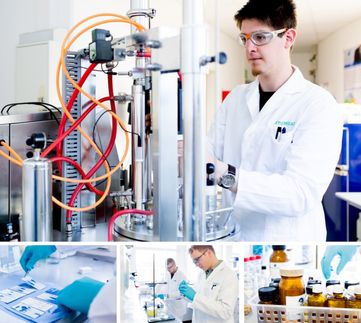BASF chemist receives 2008 Siegfried Medal
Award for chiral intermediates production process
Advertisement
Professor Dr. Klaus Ditrich, who works in BASF's biocatalysis research, is to receive the "Siegfried Medal for trendsetting work in process chemistry." This renowned prize is awarded every other year by Siegfried Ltd. of Zofingen, Switzerland, in cooperation with the Organic Chemistry Institute of the University of Zurich. The international jury, which is co-chaired by Professor Jay Siegel, University of Zurich, and Dr. Hans-Rudolf Marti, Siegfried Ltd., comprises industry and academia representatives from Europe, the USA and Asia, among them Nobel Prize Laureate Professor Ryoji Noyori from Japan. The prize with a value of 10,000 Swiss francs will be awarded at the Siegfried Symposium in Zurich on September 4, 2008. Practicable processes for producing chiral intermediates The award recognizes the achievements of Ditrich's research team in the development of technically practicable production processes for optically active amines, alcohols and carboxylic acids. These chiral intermediates, marketed by BASF under the ChiPros® brand, are used by the company's customers as key building blocks in synthesizing active ingredients for crop protection products and pharmaceuticals. Ditrich was involved in particular in the development of an industrial manufacturing process for optically active amines. The key step in this process utilizes an enzyme-catalyzed reaction that allows the two enantiomers present in the starting material to be separated in a highly efficient manner. Enantiomers is the technical term for the two types of molecule that you find in chiral molecules. They are similar to each other like your left and right hands ("cheir" is Greek for hand), just like mirror images of each other, but not superimposable. This is a small difference with a great impact on the active ingredients made from them. Only one of the two types of molecule produces the desired effect in the finished product. Chiral molecules play a vital role in today's production of pharmaceuticals and crop protectants.
Topics
Organizations
Other news from the department people

Get the chemical industry in your inbox
By submitting this form you agree that LUMITOS AG will send you the newsletter(s) selected above by email. Your data will not be passed on to third parties. Your data will be stored and processed in accordance with our data protection regulations. LUMITOS may contact you by email for the purpose of advertising or market and opinion surveys. You can revoke your consent at any time without giving reasons to LUMITOS AG, Ernst-Augustin-Str. 2, 12489 Berlin, Germany or by e-mail at revoke@lumitos.com with effect for the future. In addition, each email contains a link to unsubscribe from the corresponding newsletter.






























































